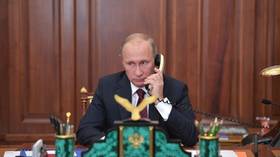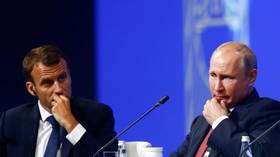Estonian PM urges world leaders to stop calling Putin

Estonian Prime Minister Kaja Kallas has urged fellow world leaders to stop calling Vladimir Putin, saying the international attention prevents the Russian president from properly feeling his “isolation.”
In an interview with EURACTIV on Monday, Kallas suggested that, amid Moscow’s ongoing military offensive in Ukraine, Putin “feels that he’s the center of attention because everybody wants to talk to him.”
“I feel that if everybody is constantly calling him, he doesn’t get the message that he’s isolated. So if we want to get the message through that actually ‘you are isolated,’ don’t call him – there’s no point,” the prime minister said.
She added that these phone conversations never bear any fruit.
“I don’t see any results, because after all these talks, Bucha happened, Irpin happened – we don’t see any signs of de-escalation,” she added, referring to the alleged war crimes that the West accuses Russia of and which Moscow vehemently denies.
Asked if diplomatic channels between the West and Russia should remain open, Kallas reiterated that she does not see “any point in talking” to Putin.
Meantime, not so many Western leaders seem to have been maintaining direct dialogue with the Russian leader since he launched the attack on the neighboring country.
Over the last two and a half months, French President Emmanuel Macron has been Putin’s most frequent interlocutor, with some of their phone conversations lasting for more than two hours. Earlier this month, the Russian president talked to his Finnish counterpart, Sauli Niinisto and German Chancellor Olaf Scholz. In late April, UN Secretary General Antonio Guterres visited Moscow and Kiev in a bid to de-escalate the situation.
Russian officials have consistently pointed out that the world is not limited to ‘unfriendly’ Western countries. In early April, Kremlin spokesman Dmitry Peskov said that “there can be no complete vacuum or isolation for Russia, it is technologically impossible in the modern world, the world is much larger than Europe.”
“Yes, and Russia itself is much larger than Europe,” he added.
Russia attacked the neighboring state in late February, following Ukraine’s failure to implement the terms of the Minsk agreements, first signed in 2014, and Moscow’s eventual recognition of the Donbass republics of Donetsk and Lugansk. The German- and French-brokered protocols were designed to give the breakaway regions special status within the Ukrainian state.
The Kremlin has since demanded that Ukraine officially declare itself a neutral country that will never join the US-led NATO military bloc. Kiev insists the Russian offensive was completely unprovoked and has denied claims it was planning to retake the two republics by force.
The West responded to Russia’s attack on Ukraine by imposing hard-hitting sanctions, including against Putin personally. The Baltic countries are known to be some of the harshest critics of Russia’s actions.













